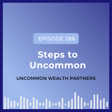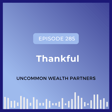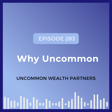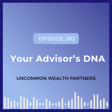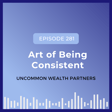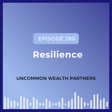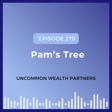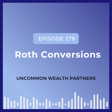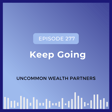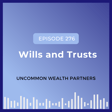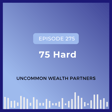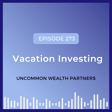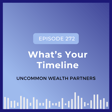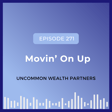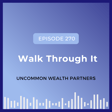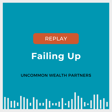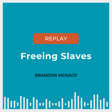Become a Creator today!Start creating today - Share your story with the world!
Start for free
00:00:00
00:00:01

Workday Ninja with Micah Johnson
In this enthralling episode of the Uncommon Wealth Podcast, host Phillip Ramsey delves into the fascinating journey of seasoned entrepreneur Micah Johnson. With a remarkable career that spans over two decades, Micah has witnessed the evolving landscape of business management, having successfully navigated challenging mergers and lucrative exits. Currently leading Workday Ninja, Micah is channeling his expertise into transforming company operations by harnessing the power of automation and AI.
Throughout the conversation, Micah shares insights into his entrepreneurial journey, beginning from his early business experiments as a teenager to his present mission with Workday Ninja. Emphasizing the importance of adapting to change and accepting differences, he reflects on the lessons learned from his business ventures. The episode is rich with engaging discussions on overcoming failures, identifying scalable opportunities, and leveraging cutting-edge technology to redefine business workflow optimization.
Key Takeaways:
- Micah's entrepreneurial journey began at a young age with innovative solutions like outsourcing lawn mowing to neighborhood kids, highlighting his early knack for business.
- Workday Ninja helps companies transition from manual processes to efficient workflows through automation and AI, ensuring employees focus on critical tasks.
- Micah emphasizes the power of adaptability in business, accepting that different approaches yield diverse results.
- Post-exit from a major business venture, Micah experienced a profound identity crisis that underscored the importance of maintaining personal meaning beyond professional success.
- Workday Ninja is committed to pioneering in the automation space, aligning business processes with modern technological advances.
Notable Quotes:
- "Acceptance of differences is crucial in business; there’s no wrong or right way, just different, producing varied outcomes."
- "I got to eat oatmeal cookies while Jake mowed my lawn, and everyone was happy… till my mom came home early one day."
- "Automation and AI allow you to eliminate the busy work, optimizing processes so your team can focus on strategic objectives."
- "The first merger opened my eyes to all the different ways we can run businesses."
- "The day after the exit was the lowest point in my life… I had a bit of a freak out."
Resources:
- Website: workdayninja.com
Transcript
Introduction and Purpose of the Podcast
00:00:00
Speaker
Everyone dreams of living an uncommon life, and the best asset you have to achieve your dreams is you. Welcome to the Uncommon Wealth Podcast. We're going to introduce you to people who are living uncommonly. We're also going to give you some tools and strategies for building wealth and for pursuing an uncommon path that is uniquely right for you.
Meet Micah Johnson, the Entrepreneur
00:00:27
Speaker
Hello and welcome everybody to another episode of the Uncommon Wealth Podcast. where I'm your host, Phillip Ramsey, and today we have an amazing guest, Micah Johnson. Thanks for being with us. Here's his bio. A seasoned entrepreneur with over two decades of experience, having successfully navigated multiple mergers and exits, scaled eight-figure businesses, and enjoyed a ah balanced lifestyle of work and leisure. ah Now he's dedicated to helping other leaders leaders achieve the same freedom and success. Welcome to the show, Micah.
00:00:56
Speaker
Thanks, thanks for having me. Dude, it's not easy to go through acquisitions and mergers. Can I get an amen? Yeah, amen. It's like ah not easy, not easy as an understatement.
What is Workday Ninja?
00:01:10
Speaker
Right, okay, so we're gonna go to that in a second, but tell the listeners what you're doing currently with work, what is it, Workday Ninja? Workday Ninja, yep. Workday Ninja, yes. Tell me about that, because it's fascinating to me.
00:01:23
Speaker
Yeah, absolutely. So essentially, you know, this is this is an amalgamation over tons of years of experience. But really, it's going into companies and figuring out where the gaps are in this whole paradigm shift that we're now experiencing. So we've got AI, we've got automation that actually works, and we can plug all these platforms together. But most businesses are still running on, hey, let's hire people to do a bunch of manual workflows and processes and copy and paste and create reports and create slide decks and do all these things that maybe not as their best skill set because they're hired to go and like account manage and sell and yes do all these other things. So we go in and we eliminate the busy work with automation and AI and optimized processes.
00:02:13
Speaker
So all the latest, all the listeners know like why we we want you on the show. Okay. tara Now that's really good. Okay. So let's go back to the the mergers and the acquisitions, and the exits and all that stuff.
Lessons from Mergers and Business Management
00:02:25
Speaker
What do you think the biggest thing you learned in all the things and all the ways that God's like introduced to all this stuff? What do you think the biggest thing that you've learned through that? Oh, I would say acceptance of differences. ah yeah I would say, um,
00:02:41
Speaker
going into the the first merger that I went through was it was not the scale at the second one. The second one, I was still kind of in the mindset of like, I'd say a bit my way or the highway, like this is obviously the right way to do things. So we're going to do it this way here. And we created a very clear structure and process driven environment company that we merged with.
00:03:06
Speaker
did not have all of that in place. They were larger than us in revenue. and so you know just as you know Without getting too much on a tangent, it was very interesting and very eye-opening to go Holy crap, we can run businesses in all different types of ways and manage in all different types of ways. And there is no wrong way or right way. It's just different ah andh and it produces different outcomes. So, yeah. It is fascinating for me. the ah The times I get to talk to individuals that sold their business, but they have to stay on board for a time is like they all seem like they come to that same conclusion of like, what?
00:03:48
Speaker
This is not the same. And like, as you're a business owner, you kind of get caught in the rut of the how you do things. And it's not easy to change because like it's your business. So you're like, no, we're going to do it this way because this is the way my mind works. And then when you get pushed in something else and it's not your business anymore, it's an up-road battle. I'll just say that.
00:04:11
Speaker
Yeah, very much so. It says you're a serial entrepreneur, which again, I call it kind of the uncommon path. But how early on did you start
Early Entrepreneurial Ventures
00:04:20
Speaker
that? And you obviously went to college, then you stepped out of college and you said, Hey, I want to be I want to be doing this myself. Talk to me. Yeah, I didn't. Honestly, I didn't last too long in college. you And so where did I start this? um Officially, my first business started when I was 20.
00:04:41
Speaker
Unofficially, it was when I was about 14 or 15, when I was tasked with mowing the lawn, yep and I would get paid $14, I think a week, if I remember right, spent a while now to mow the lawn. And I quickly went to the neighborhood kid and said, Hey, Jake, I'll pay you $7 to mow my lawn. Yes, I love it.
00:05:09
Speaker
And he was like, heck yeah. So I got to, you know, eat oatmeal cookies while, ah um you know, when they were friends. And he was happy, you were happy, and your dad was probably happy. Everybody won until my mom came home early one day. Oh my God, that's great. There is something to be said about that though, like the just the power of thinking outside the box.
00:05:39
Speaker
And yeah for you, like, okay, my neighbor's going to win. He's going to get $7. I'm going to win because I don't have to do anything. I'm going to get $7 and my dad's going to win because you know my parents are going to win because their their their house is going to be mowed. Their lawn's going to be mowed. Um, yeah, at the time I didn't think any, like, I didn't think it was anything different than anybody else would think. And I didn't think there was anything wrong with it. I still don't think there's anything wrong with it. Like I'd be super impressed with my son. Yes. I'd be proud of him. Like, yeah, that's great, man.
00:06:09
Speaker
Yeah, good for you yeah. And that's what my mom tells me. She's like, I got home and I'm like, she she said, I don't know if I should be mad at you or excited that you figured this out, that you sold him on this. Like, I didn't know what to do. Oh, that's good, Micah. And so now you kind of do that same thing. Like you go into businesses and companies and you're like, okay, what is it that you're needing to get done? Do you have a niche or a different company like specific company you like to work with? Or you're like, I'll do any company.
00:06:36
Speaker
So after my last exit, I started consulting and I would take on any any type of company and where my head was at then was I just want to i just want to understand because that that merger really opened up my mind to saying, okay, there's all different types of ways to run companies. So then that company was predominantly in the United States. We had a couple clients in Canada. We had Puerto Rico, um which is of course is a Commonwealth. So um we were very state centric.
00:07:09
Speaker
And after that merger, I'm like, man, wouldn't it be cool to see how companies all over the world are run? And so I pursued um engagements all over the world, even with completely different time changes like Australia. And that's a whole to of different time. And they have different seasons. Our summer is their winter and their winter is our summer. banana yeah so The first time i I'm like, no, no, anyway, that's true. Okay.
00:07:37
Speaker
Absolutely. i I remember jumping on a Zoom with them thinking, why are they so why are they all wearing coats? like yes why is Why are they all wearing sweaters? Yeah. That's funny. Okay. Let's talk about, I know I'm all over the map, but it's there's just a lot to cover here, Micah. I'm sorry.
00:07:54
Speaker
but let's talk about your first business that you started up like officially and then walked away from and sold it like what was that company and then let's talk about that you know the the exit yeah so that the company's name was oculus media it was a terrible name.
00:08:12
Speaker
because I thought, you know, I thought I was as 20, I thought I was being really cool. Let's, let's make this really cool oculus ocular. It's about site. It was a web design and web design and hosting company. And the main problem with the name, as I'm sure you can guess, is that nobody knew what the hell I was saying, or could spell it. And so that, that was troublesome, but I would old call all day long, and then work on the projects at night.
00:08:42
Speaker
Wow. Yeah. So me and a buddy started that up and, um, yeah, we ended up scaling that to about 300 clients. So it got to the point where I couldn't cold call during the day anymore because we started getting referral clients. And there was just this, I remember just this feeling like this shift that happened where all of a sudden the phone was ringing and other people were referring us. So that became our client acquisition method.
00:09:12
Speaker
which is wonderful. And, um, but I found out later on that one of the reasons that so many people were referring me is because I was charging so little. That's right. That's right. That I was, I was that guy. I was that guy. That would be really great work for really little money. And everybody's like, Oh, you got to go talk to Micah. And here I'm thinking like, yeah, yeah I'm doing great work. Which you probably were like,
00:09:39
Speaker
It was was, but we couldn't scale. Right. Right. Oh, that's so good. And so what did you decide? Like, all right, we need to put a pin on that one.
Strategic Business Mergers and Growth
00:09:48
Speaker
Let's move on. How did you get out of that? Yeah. So I got introduced to a guy that was running an email marketing company and in Minneapolis where where I grew up and we started chatting. And so he's like, dude, like,
00:10:04
Speaker
let's Let's work something out. let's ah Let's join forces. Love to have you come on board. you know yeah Let's do that. so that's um that was kind of like and and he He called it. He goes, you know you've got these clients, but you're probably not making that much money. When I sat down and really looked at them, I'm like, you're right.
00:10:24
Speaker
you're right right So it was a perfect acquisition pitch for a young entrepreneur, which was, hey, I'll absorb ums are your business, I'll absorb you, and then I'll guarantee you get paid more. Deal. Okay. Yeah. Yeah. Right. Okay. So you did that for how many years? Then you moved over to his company, Oculus Media, gone away.
00:10:48
Speaker
yeah no Yeah, so that one merged. I worked with them for about a year. It was essentially, um they opened up an office in a small town in Nebraska. And um so Minneapolis to small town, Nebraska. It's not gonna work out. I ended up, yeah, it didn't work out. but short a Short story, then in my early twenties, early to mid twenties, nope.
00:11:14
Speaker
Yeah, nope for sure. Wow. Okay, so then Micah goes off and then what do you do next? yeah Well, I didn't know what I was going to do next. I knew I got myself in quite the pickle. So I'm sitting in Nebraska. I remember to this day, it was about um I had an opportunity to speak in Fort Lauderdale. And so I was prepping for that trip and about two weeks before that trip, I had to figure out hobbies in Nebraska.
00:11:42
Speaker
because, you know, I didn't really know what to do with myself. And right. Yeah. that photography I'm like, I'm going to take pictures of this, these cool landscapes that I have around me. And I remember traipsing through fields in Nebraska, coming back the next, the next day, waking up and thinking, wow, my ankles really itch. What is going on?
00:12:06
Speaker
And I had a horrible case of the Chiggers, which all around my sock line, all around. And I'm just like, okay, it's time. that That was a week before I'm going to Fort Lauderdale. And I'm like, okay, that's a sign. i This is this is not not for me. And I go down to Fort Lauderdale. I speak, I took an extra day. I'm not at the beach on that extra day. And so now we're going from Minnesota to Nebraska to la Lauderdale with beaches. and it's palm trees and ocean and the smell and the sand. And I'm on the beach going, oh, this is the type of environment that I need to be at. This is good. Like lakes are great. 10,000 lakes are great, but an ocean. But this, yeah. Yes. Right. Now we're
Career Transformation: Nebraska to San Diego
00:12:51
Speaker
talking. And the very next day as the universe sometimes work, I'm sitting at the gate waiting for my air at the airport, waiting for my plane to come in.
00:12:59
Speaker
One of my original clients calls me up and he's like, Hey man, I've got this idea for an analytics play. I've already got the office. I'll fly out to San Diego. No obligations. Come on out. Check it out. And I'm thinking free trip to San Diego. Yeah, for sure. yeah at a ba I'm out of Nebraska. Yes. Yeah. Yeah. And so that was the, that was the, um,
00:13:23
Speaker
I would say the but trigger that got me from Nebraska to San Diego, which is, a and as an early 20-year-old, a huge, massive culture shock and upgrade. Right. We're not in Kansas anymore, Toto, or whatever that yeah line is. yeah Okay. And so it worked out. It worked out. You decided to take the plunge and head down that route. Yeah. We, uh, moved, you know, I'm not, I made, I didn't even date in Nebraska. So anybody who was listening was from Nebraska. I went camping in Nebraska last weekend and it was amazing. Yes. It was absolutely incredible. There are beautiful places there, but for early to mid twenties, like 20 year old, lots of chiggers too. Yeah. Yeah.
00:14:07
Speaker
So um I did. I almost had like some PTSD response from like, I am not walking towards tall grass. I guarantee you did. Yes. yep Yeah. Yeah. Save it. it was It was great. A great experience, but it is a beautiful state. it it's and It is a pretty cool place and there are some major hidden gems, but San Diego was ah exactly what I was looking for. It had the beaches. It had the palm trees. It was beautiful. It had the right weather. We had an opportunity. We raised a little over a million dollars to fund that business. We scaled to about 19 employees. We had a great book of business coming in from the family of businesses that we were working with. and um and That was right at the be it was kind of at the end of
00:14:52
Speaker
ah like MySpace and the beginning of Facebook where Facebook had just become a platform and introduced that you can build apps and started targeting businesses. And so I saw the writing on this on the wall going, Oh, man.
00:15:09
Speaker
This feels like how it felt when I was doing web design and hosting right at the beginning of web design and websites. Like I remember making those original cold calls when I was 20 and people still telling me, that's the devil. I am not going to be on the internet ever. And, you know, so I started getting that same, not that, um, well, it's arguable on social media, but, yeah um, right.
00:15:37
Speaker
Uh, so, but I started getting that same feeling, right? Like there's a paradigm shift happening. There's something that I can grab onto here that I can see is happening. And so about a year, year and a half into working with that company, I ended up quitting and turning them into my first client in one meeting and that funded essentially me in my living room to then repeat the effort of I'm going to start making cold calls. I'm going to start reaching out to my now growing personal network and I'm going to say, Hey, I can help you reach this audience without ads by hitting this thing called social, are the social arena because social media wasn't a buzzword
Building and Scaling a Marketing Agency
00:16:22
Speaker
yet. Right. And so I had to call it something. Um, and that ended up turning into a 12 year journey.
00:16:30
Speaker
So really yeah, yeah it was it was amazing. So um scaled that up, focused on what now is social media marketing, no ended up specializing in multi-location businesses. So I didn't want to do the mom and pop, the single location thing. There was a bigger play here that I saw with you have multiple locations and you're managing multiple Well, brands, those are unique problems to this new paradigm that we're entering. And I wanted to solve those more complicated problems because I knew that'd be more valuable. So that's what we went after. We ended up getting into um auto groups and radio groups, multi-location, multi-brand. yeah And we dealt with social media and reputation management. We had a services component to that business. We had a software component to that business that dropped up.
00:17:23
Speaker
Yeah. And then that's the one that you sold for. That was the one that you kind of came in as like, OK, let's lower our expectations here. and so There's more than one way to do this. And then somebody came out and was like, hey, Michael, I'd love to purchase that bad boy from you. And you were like, all right, let's see what we can do.
00:17:40
Speaker
Yep. Essentially very, very short summary, but yes. Yeah. And then, so you got through that um at this point. Now you married, you're married been 12 years and you have an eight year old son. So where is that in the continuum of your relationship?
00:17:56
Speaker
So I don't know if I should share it in a podcast, but I met my wife from hiring her. She was one of my early hires. Yeah, you did scandalous Micah scandalous. I like it. That's uncommon. Woo. Yeah. Check that one off. and So yeah, it was, um, but it was one of those, honestly, it was a love at first sight thing. It was a current employee who was like, Hey, I've got somebody who I think would fill the position that we're looking for. And he referred her.
00:18:26
Speaker
And I remember walking into the interview, she was wearing a black dress, she has long straight blonde hair. And I can't remember anything else about that interview. Straight up blackout. but Like I just remember kind of being like,
00:18:43
Speaker
Oh, All right. I don't know how I'm going to handle this or make it through this, but, uh, we're just going to go for it. And I have no recollection of and you don't know how you did and what I said. you obviously did yeah so I said something right because she did come to work for me. We worked together for almost two years. Um, and then, uh, we ended up, uh, dating for about three months before we got engaged and, uh, we were engaged for about six months, very short turnarounds here. Come on. Yep.
00:19:13
Speaker
you know what you want And then we've been happily married ever since. That's great. So where were you in the continuum of all that? So you were still working at that company? and No, that was after I started my second business and scale scaled the second one up. We were probably at about eight employees and okay at the time.
00:19:35
Speaker
ah yeah Yeah. Okay. So this has been the second exit you've had um acquisition. Great job. And then now you are sitting there with probably some fairly good money and scratching your head of like, but Mike is not done.
Post-Exit Identity Crisis
00:19:50
Speaker
Right.
00:19:52
Speaker
It's interesting. I'm sure you've probably heard this from other people because when I share this, other people have said, yeah, I hear that a lot. yep um But after that exit, it was the lowest point in my life. yeah Hands down. yeah the day ah The day after, right? I woke up and I'm like, I have no emails to answer, no slacks to answer, no use and I instantly went down this like, oh man, I'm useless. What am I going to do now? Right. Who's going to hire me? I've been self-employed since I was 20. Like I'm going to.
00:20:28
Speaker
Yeah. What am I going to do? all every The world is going to pass me by. ah huh Right. This is true. I don't have a freak out. Yeah. So I had a great interview with a close friend of mine, him and his business partner. They sold their company and then within three weeks they both had a panic attack, both of them. And they had a fairly good size check in their bank account and they were like, what just happened? Like, what has happened? You know, like there's like an identity crisis. there Absolutely.
00:20:57
Speaker
there's just ah There's also too, like entrepreneurs and business owners, and when you're scaling it up, like you push yourself very hard. And so you really don't know what the byproduct of that stress and that drive is going to be. I'll tell you, it'll hit you.
00:21:13
Speaker
Because after that interview, Micah, I was thinking to myself, man, I'm super grateful that I don't have this huge amount in my bank account. Because like, I'm gonna do the same thing tomorrow that I did yesterday, you know, like, but yeah, there is a point where like, that's no longer and you have to like process through that. Oh, man. Oh, it's hard. It was hard. Yeah, it was one of those things where it's like,
00:21:36
Speaker
we We obviously had more money than we ever had in our lives. I didn't wake up or I didn't grow up wealthy. um you know my My wife in ah in a similar boat, um but it was like,
00:21:48
Speaker
but Like shortly after that, it was like, um, I'd be like, well, why'd you buy the expensive tea? Like or if we keep doing things like this, we're going to run out of money before we're dead. Like yeah like totally freaked out about all of it. And she's just like, what are you talking about? Like,
00:22:06
Speaker
you're being ridiculous. Uh-huh. And in my mind, cause I'm, I was so, I think I had trained myself in scaling the companies that it's like we, we have cashflow. Like I was still operating as a business, but now it's personal and there was no income coming in. So that means it's finite and everything just drops from this point forward. Right. And, um, yeah, it was, it was tough. It took me a long time to work through. I thought I would solve it by doing a passion project, which just,
00:22:36
Speaker
wasted a bunch of money. I had some good learnings, but um ah definitely definitely spent some money on that passion project that was never destined to succeed for anything. um And then um I ended up ended up helping a friend who actually was my drum instructor in San Diego. Okay. And he stood up an online drum lesson business, which I mean, props to him. He did such a great job. It's called drum ambition. If anybody's listening and wants to learn drums, it's like top notch, top quality. I just really admired how much passion he put into the quality of the videos and the quality of the courses and everything. um So then I was able to kind of say, okay, wait, i've I've got some skill sets here that could help get this stood up.
00:23:33
Speaker
And so he started with one module. We expanded that to essentially five is with a couple, two bonus modules. We updated the technology that we were using. We improved how we were doing the marketing, the targeting, everything else, and essentially turned it into a well-oiled machine. So even as a essentially single operator, he would fill his day with responses and follow-ups and all this stuff.
00:24:00
Speaker
And we built systems. that's correct So then he was like, what, do then he had his panic attack was like, wasn't money driven, but it was like, but ah now what do I do? I have to find other things to fill my day. But that also last year we were able to um work with some VCs and. um Do some pretty cool stuff on that side as well so nice okay but that was where you kinda niche down of like figure out like oh i'm good at processes i'm gonna put this stuff together. There is a real niche for me here which i agree and so there there's there's what is it work workday ninja workday ninja was born.
00:24:38
Speaker
Yeah, between the merger um that we did through that 12-year journey, near the end of that, we merged with one of our competitors and that helped lead to the exit. And then getting you know the drum lesson company stood up to a point where it was, again, going to make it through some due diligence and be of interest to somebody else. ah Then I'm like, okay, we can There's, there's so like, this is stuff that I like to do. I'm, I'm good at this.
00:25:08
Speaker
who Oh, that's good. So you, what I think about you in this position that you're in now is every day is different where all the other days I think they were different, but they were all kind of the same status quo where this, you get to jump into a lot of different businesses and like try to figure out what's
Finding New Fulfillment in Consulting
00:25:25
Speaker
the process. Okay. How can we make that more efficient? Which it's all kind of the same tools, but it's different businesses and how you apply those things. So I think that's probably scratching your itch of just this, this,
00:25:36
Speaker
It is yearning to try to continue to push yourself, continue to learn more other industries. Oh man, the sky is the limit, my man. Yeah. Yeah. And that's when, you know, when I was doing the direct consulting after the exit, directly after the exit, um, that's when it was like, my first client was based in Norway. Um, I got a client in Australia where we worked with people in Uruguay, um, with us in Estonia, France, Germany, Spain, go see them at all. You could. Right. Um, so the, the first company that I worked with was headquartered in Oslo and they had offices in St. Petersburg and Moscow.
00:26:15
Speaker
And this is before all um yeah yeah the latest stuff happened. um But they were having, you know, they invited me out. So I got to go explore Moscow for over a week. wow It was amazing. You know, we would get together for breakfast and then work all day and then have a great lunch and and then go explore.
00:26:38
Speaker
every evening was a different plan for something. It was just absolutely incredible. um But COVID hit kind of during the um middle main part of when I was doing the consulting.
00:26:53
Speaker
before I scaled up into teams and everything. Um, so travel wasn't, I actually had a second trip with that company already booked plan to go to Sochi and had some really cool stuff planned and then stop in Berlin on the way back. Oh, that's a lie. Shut everything down. ah Yeah, it was disappointing, but huh. Okay. So how long has Workday Ninja been up and running? So it was a,
00:27:21
Speaker
I would say officially, we had the company for as long as I've been doing consulting. We originally called it BGBO. Okay. And it was the idea of being um biggest goal, biggest obstacle. And so we achieved the biggest goal, solve the biggest obstacle. But BGBO is a very complicated set of four letters, especially an email that again,
00:27:44
Speaker
very tough for people to remember in the right order and get right. right So last year we started to rebrand to Workday Ninja, and that got us to where we are now. But essentially, I would say as as teams have grown, it's been about a three-year endeavor that we've scaled up teams, refined exactly where we're offering value, how to focus on automation and AI, how to do the process mapping and identify gaps and opportunities.
00:28:10
Speaker
and really just dial all of our own systems and to provide as much value as possible. great How many employees do you have currently at Workday Ninja? so we have a We have an account manager, a project manager, a marketing person, um production team lead, myself and my partner.
00:28:30
Speaker
And so that's seven or six, and then we have four production team members. So fairly lean, but 10. Yeah, that's good. Yeah. What's the future? Do you see of Workday Ninja?
00:28:44
Speaker
I think it's a couple of things. I think we're definitely doubling down on the whole process optimization, the transition of the old paradigm to the new paradigm that we're in. So it seems like every every business I've done is at the beginning of a paradigm. Websites, social media, yeah automation and AI. Good observation. so Yeah, I'm doubling down on that.
The Future with Workday Ninja
00:29:09
Speaker
That's that's our focus. And we're introducing rather than just us do a bunch of done for you stuff. And then we introduce it to the companies that we're working for working with. um We're introducing a bunch of educational resources now. So programs to help leadership get like we're calling it get to out of office. So this whole mentality of
00:29:31
Speaker
There's enough tools out there now where your employees and your team members get the benefit of actually leaving work at work. But as as a leader, as a founder, as a business owner, it's very hard to do. but And as soon as you step away, you're like, and he's gonna fall apart. And so basically building up a cohort of like-minded individuals to say, what are the systems you need in place? What's the right mindset you need in place? How do you think about automation? How do you think about AI? How do you design your company so that you have the capability to get out of office, to go camping in Nebraska, to just mountain bike during the afternoon if that's your jam?
00:30:12
Speaker
just a step away without that panic ensuing and then we're also doing a 10-week course called an automation bootcamp which is if you don't know anything about automation you can start there and in 10 weeks you'll be able to process map identify what can be automated create the automation and maintain the automated systems. That's cool. So give me the price points of all like your offerings. Like for you guys to come in and do the whole deal, like we'll process, we'll AI a whole thing. Like that's probably your top tier. And then the other, the other kind of bottom, right? So like, what are we ballpark? You don't have to give us like perfect. Yeah.
00:30:49
Speaker
Sure. Of course, we have it all all set up. For the top tier, for us to come into a company, it's typically $5,000 to $8,000 a month. Engagements range from three to six, sometimes longer.
00:31:05
Speaker
month-long engagements and that gets us you know in there, identifying the gaps, process mapping, building stuff out, training the teams on how to use the new systems, and then rinse and repeat. And the longevity of the engagement is how much stuff do you want to get done? what's What's going to continue to create impact? So that's kind of the range of that. um The Get Out of Office program is $4,000 for the year.
00:31:33
Speaker
And then the automation bootcamp, I should say for the get out of office, it's designed for the concept that you have a visionary and an integrator. And so you bring those two people together for that same price point. Sure. And that way you have both sides. If you're an integrator,
00:31:51
Speaker
you're going to get the benefit of knowing the opposite side and vice versa. And then the Automation Bootcamp is $4,000 for the 10 weeks, but then we support for six months after that. And that's per person.
00:32:05
Speaker
That's great. Awesome, man.
Closing Thoughts and Embracing the Uncommon Path
00:32:07
Speaker
Well, Micah, so good to just hear what's going on with Workday Ninja and all like your path, because I'd say it's uncommon. But what ah what a cool opportunity just to be able to be at the forefront of this. um So if any of us or any of our listeners wanted to get a hold of you or Workday Ninja, what would be the best way to do that?
00:32:27
Speaker
Yeah, workdayninja.com. You can find all of our contact information on there. Workday Ninja on YouTube. We're always releasing great videos on tutorials and a lot of the stuff that we've talked about today. How do we do certain things and why do we think about the things that we're we're doing and implement across the board. We just released our own podcast for a couple episodes released now called Automate Your Agency. And so that's my business partner and I, we each have very different perspectives on things. So we have a dialogue throughout all of our experiences over the years of scaling the last business and getting into this one and what that but actually means and looks like and sounds like.
00:33:12
Speaker
That's good. Well, ah thank you for your wisdom. Thanks for just spend some time with us today Until next time you've been listening to the uncommon wealth podcast. I've been your host Philip Ramsey until next time go get automated and be uncommon. Thanks for listening That's all for this miss an episode as we introduce you to inspiring people who are actively pursuing an uncommon life.
